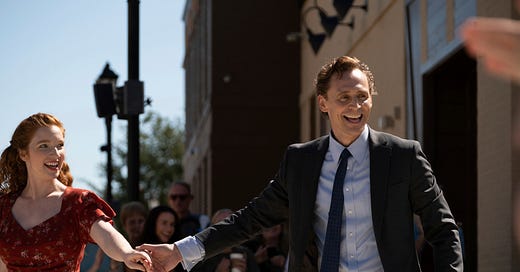'The Life of Chuck' isn't sorry for your loss
Adapting Stephen King, Mike Flanagan finds joy in life's fleeting nature
“The Life of Chuck” writer-director Mike Flanagan makes a small cameo in his movie as a mourner at a funeral. He quickly and uncomfortably mutters a platitude (“So sorry for your loss”) to the bereaved, in a hurry to get through an awkward social interaction.
It’s a bit of an in-joke, because “Chuck” is such a powerful and direct film about life and death, looking unblinkingly but compassionately at the undeniable, inescapable truth that our time here is finite. We may not get as much time as we would like. We almost certainly will not get to spend that time in exactly the way we wanted. But the fact that we get it at all is something to cherish.
Perhaps worried that such a life-affirming message might come across as too corny, “Chuck” starts off during the apocalypse. (Did I mention that the movie is an adaptation of a Stephen King short story?) Marty Anderson (Chiwetel Ejiofor) is a high school English teacher trying to keep his students interested in poetry as the world seems to be falling apart around them.
The internet is on the fritz, civil wars and environmental catastrophes are everywhere, and ordinary people seem to be just giving up, quitting their jobs and going home to wait for the end. It’s a frighteningly familiar heightening of the anxieties that we carry around today.
With one exception. Everywhere Marty looks, he sees odd billboards and TV commercials that feature a bespectacled man in a suit, and the phrase “Thanks Chuck For 39 Great Years!” Who is Chuck? And why should he be thanked?
Perhaps further confusing matters is that this first section of the film is labeled “Act III.” The next two acts go back in time to explore who Charles “Chuck” Krantz is, played by Tom Hiddleston as an adult in Act II and by Jacob Tremblay and Benjamin Pajak in Act I.
“The Life of Chuck” is less about plot than incident, the things that happen to Chuck and, especially, the people he meets along the way. It’s a movie that has room for mysterious locked doors and middle school crushes, Walt Whitman and Wang Chung, and not one but two fantastic dance sequences that made the hairs on the back of my head stand up.
In classic King fashion, the lively narration by Nick Offerman occasionally veers off to give us a mini-bio of some of the people Chuck meets along the way, to help us understand the significance of the moments (sometimes fleeting) when two lives intersect. The movie is packed with small, indelible performances, including Carl Lumbly as a funeral home director, Karen Gillan as Marty’s ex-wife, and Mark Hamill and Mia Sara as Chuck’s grandparents. (Incidentally, if you want to make a movie that makes Gen X viewers acutely aware of the passage of time, cast Luke Skywalker and Sloane from “Ferris Bueller’s Day Off” as grandparents.)
As these characters and occurrences add up to become one man’s life, “The Life of Chuck” will likely earn parallels to “It’s a Wonderful Life.” While each of those pieces are meaningful on their own, it’s the accumulation of them over time that gives the movie its power. In some ways, Flanagan the storyteller keeps us so invested in figuring out what’s going on, and how all the pieces fit together, that we might not even realize how much the film is slipping past our defenses and affecting us emotionally. “The Life of Chuck” is one of my favorite movies of the year, but I was dry-eyed until the absolute final shot.
And then I just lost it.
“The Life of Chuck” is playing in limited release now, and will expand nationwide on Friday.



